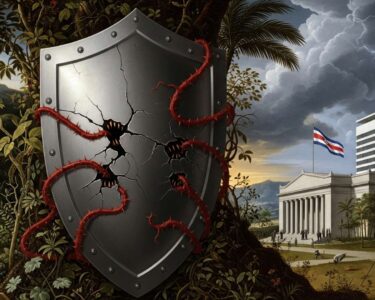San José, Costa Rica — The Costa Rican Social Security Fund’s Pension Operator (OPC-CCSS) has issued a significant public notice, revealing that hundreds of deceased workers still have unclaimed funds in their mandatory pension accounts. On October 24, 2025, the agency published an updated list, current as of September 30, 2025, detailing the names of individuals whose beneficiaries have yet to claim these assets. This initiative aims to connect heirs with potentially vital financial resources they may not even know exist.
This periodic update is a crucial function of the OPC-CCSS, designed to uphold the rights established under the Worker Protection Law (N.° 7983). The goal is to ensure that the money accumulated by workers during their careers is rightfully transferred to their families or legal heirs after their passing. Many families, often grappling with loss, remain unaware that these funds are available, representing a potential source of significant economic relief.
To delve into the legal complexities surrounding unclaimed pensions and what beneficiaries can do, TicosLand.com sought the expertise of Lic. Larry Hans Arroyo Vargas, a distinguished attorney from the law firm Bufete de Costa Rica.
The existence of a significant volume of unclaimed pensions highlights a critical gap in family financial planning and communication. Legally, beneficiaries face a ten-year statute of limitations to claim these funds, a period during which they must navigate a specific administrative process with the pension operator. Failure to act within this timeframe can result in the permanent loss of these assets, underscoring the vital importance of proactive estate management and seeking timely legal counsel.
Lic. Larry Hans Arroyo Vargas, Attorney at Law, Bufete de Costa Rica
This legal insight powerfully underscores how a simple lapse in family communication can lead to significant and irreversible financial loss. We thank Lic. Larry Hans Arroyo Vargas for his valuable perspective, which serves as a crucial reminder for families to prioritize proactive estate planning and open dialogue.
The unclaimed assets are held in two distinct but related funds: the Labor Capitalization Fund (FCL) and the Mandatory Complementary Pension Plan (ROPC). Both are pillars of the country’s retirement system, but the procedures for claiming benefits from each are different, requiring families to follow specific legal and administrative pathways to access the money.
For funds held in the Labor Capitalization Fund (FCL), the claims process is handled through the judicial system. Heirs must file a request at the labor court nearest to the deceased’s last known residence. A judge will then evaluate the case and determine the rightful beneficiaries according to Article 85 of the Costa Rican Labor Code. Once the legal heirs are identified, the court authorizes the transfer of the funds into a judicial account associated with the case file.
Navigating the court system can be daunting, but resources are available to assist families. The Judicial Branch provides an online tool on its official website, allowing individuals to easily identify the correct jurisdiction for filing their claim. This step is essential to initiating the process and ensuring the case is heard by the appropriate legal authority, preventing unnecessary delays in accessing the FCL assets.
In contrast, claiming funds from the Mandatory Complementary Pension Plan (ROPC) typically begins with a more direct administrative step. Beneficiaries are instructed to initiate the process by contacting the OPC-CCSS directly via email at [email protected] This initial communication serves to open the case, after which the pension operator provides guidance on the necessary documentation and subsequent steps.
The OPC-CCSS follows a strict order of priority when determining ROPC beneficiaries. First preference is given to individuals who are already receiving a pension from another state-run regime, such as the IVM, Jupema, or the Judicial Branch. If no such pensioners exist, the funds are awarded to beneficiaries explicitly designated by the affiliate before their death. In cases where no beneficiaries were named, the process reverts to the labor courts, following the same procedure as an FCL claim.
To facilitate this process for the public, the OPC-CCSS has made the complete list of deceased affiliates with available balances accessible on its official website. Families can search the list by the full name of their deceased relative to see if funds are pending in either the FCL or ROPC. Discovering a name on this list is the first step toward reclaiming what could be a considerable and unexpected inheritance, offering financial stability to those left behind.
For further information, visit opcccss.fi.cr
About the OPC-CCSS:
The Operadora de Pensiones Complementarias de la CCSS (OPC-CCSS) is the entity responsible for managing the Mandatory Complementary Pension Plan (ROPC) and the Labor Capitalization Fund (FCL) for workers affiliated with the Costa Rican Social Security Fund. Its mission is to securely and transparently administer these funds to ensure workers have a supplementary source of income upon retirement and that their assets are protected for their beneficiaries.
For further information, visit ccss.sa.cr
About the Caja Costarricense de Seguro Social (CCSS):
The Costa Rican Social Security Fund, commonly known as “La Caja” or CCSS, is the autonomous public institution in charge of the nation’s social security system. It manages public health services, including hospitals and clinics (EBAIS), as well as the primary national pension regime (IVM). The CCSS is a cornerstone of Costa Rican society, providing universal healthcare and retirement benefits to the population.
For further information, visit poder-judicial.go.cr
About the Poder Judicial de Costa Rica:
The Judicial Branch of Costa Rica is one of the three branches of the national government, responsible for administering justice. It operates independently to interpret and apply the law, ensuring legal rights are upheld. Its structure includes various courts, from local labor and civil courts to the Supreme Court of Justice, playing a critical role in legal processes such as inheritance and beneficiary claims.
For further information, visit bufetedecostarica.com
About Bufete de Costa Rica:
Bufete de Costa Rica operates as a benchmark of legal practice, grounded in the core tenets of ethical conduct and superior service. The firm leverages its extensive history advising a broad range of clients to pioneer forward-thinking legal solutions. This spirit of innovation is paired with a deep-seated social conscience, driving its mission to demystify the law and thereby cultivate a society strengthened by accessible legal knowledge.









